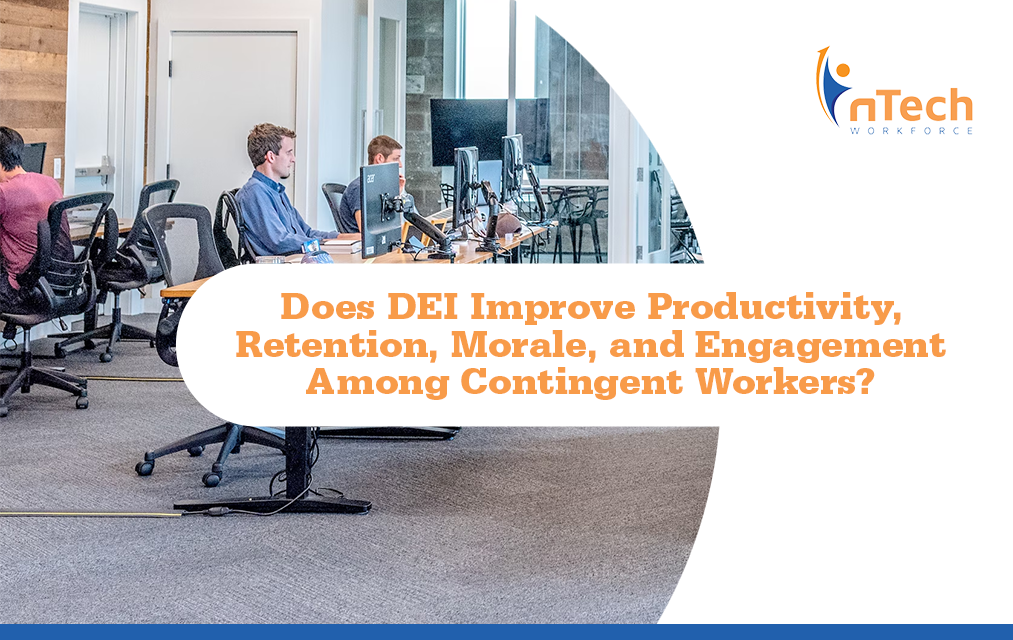How Can Business Leaders Build Trust Through Effective Communication?
In the realm of leadership, the ability to build trust through effective communication is a fundamental skill. How is trust defined in the context of...
4 min read
![]() nTech Workforce
:
Apr 23, 2024 9:00:00 AM
nTech Workforce
:
Apr 23, 2024 9:00:00 AM

The responsibility of People Operations leaders transcends traditional boundaries in today’s work landscape. As contingent work has grown, the role of People Ops in fostering collaboration and nurturing strong team dynamics becomes paramount.
In this nSider blog, we explore the pivotal role of People Ops leaders in cultivating a cohesive and inclusive work environment among contingent workers. By delving into actionable strategies and best practices, we aim to equip People Ops professionals with the insights necessary to bridge the gap between permanent and contingent workers, foster a sense of belonging, and maximize the potential of diverse teams.
With insights from Andrea Briere, People Operations Lead, we’ll unravel the key principles and practical approaches that empower People Ops leaders to navigate the complexities of modern workforce dynamics and champion collaboration.
Briere best explains “The nature of contingent work is rapidly evolving, and each assignment is different, which means that People Ops leaders need to be willing to adapt to change.”
Managing contingent workers presents challenges due to their often remote locations, creating communication barriers with People Ops leaders. This divide is compounded by the natural inclination of contingent workers to rely on their onsite or client teams for support. Key challenges include:
Overcoming these obstacles requires proactive measures to foster transparent communication channels and ensure remote workers feel connected to the broader organizational culture. Additionally, establishing robust management protocols and tailored onboarding/training strategies can enhance the integration of contingent workers into the company ecosystem.
By embracing flexibility and responsiveness, organizations navigate the complexities of contingent work arrangements more effectively, fostering collaboration and maximizing the contributions of team members.
There are numerous ways People Ops leaders can encourage engagement among their spread out, and often remote, contingent employees:
While these are strong tactics to foster contingent workers’ engagement, People Ops leaders must stay updated on the resources/tools that allow productive communication, effective onboarding processes, and continuous feedback to reach their team(s).
Remote collaboration tools are essential to fostering effective connection and collaboration amongst contingent teams that are spread out.
nTech Workforce employs various strategies to enhance communication and engagement among its workforce. For example, utilizing feedback platforms (e.g., Sense) enables the automated distribution of surveys to gather insights on individual experiences and suggestions for improvement.
Additionally, incorporating virtual meeting tools (e.g., Google Meet, Microsoft Teams, Zoom, etc.) inspires face-to-face interactions and promotes meaningful conversations in an era of remote work. This personal touch helps maintain connections and mitigates the detachment often associated with virtual communication.
Briere suggests leaders don’t forget the power of social media, emphasizing the importance of “Creating a virtual community where team members can connect, share updates, and engage in discussions. This fosters a sense of belonging and encourages informal communication.”
Leveraging social media platforms such as LinkedIn, nTech promotes company news, encourages engagement, and builds connections among team members. By creating a virtual community for your organization, employees can share milestones, engage in discussions, and feel connected. These initiatives promote transparency and collaboration while nurturing a supportive and inclusive work environment where employees feel valued despite geographical barriers.
Regular check-ins play a pivotal role in encouraging consistent, open lines of communication while building trust within your team(s). For example, nTech’s HR team prioritizes frequent check-ins with employees. This gathers essential feedback and addresses any concerns.
Briere notes the significance of “Cultivating a sense of psychological safety. This environment of trust is essential, especially considering the remote nature of [our] work, where face-to-face interactions are limited.” By actively encouraging employees to voice their concerns and provide feedback, it ensures they feel supported throughout their onboarding and assignments.
Building meaningful connections with employees is another cornerstone of effective People Ops leadership. Some ways leaders can grow more personable connections include:
A company’s NPS (Net Promoter Score) responses and ratings gauge employees' likelihood to recommend the organization to others, reflecting their overall experience. This metric often correlates directly with the effectiveness of People Operations' work and team-building endeavors.
A high NPS indicates that employees perceive the company positively and are inclined to endorse it, reflecting the success of People Ops initiatives in fostering a supportive and engaging work environment. Conversely, a low NPS may signal areas for improvement in employee satisfaction, communication, or organizational culture.
Briere comments: “By tracking NPS responses, People Ops leaders gain valuable insights into employee sentiment and can tailor strategies to enhance engagement, address concerns, and strengthen the employer brand. This proactive approach boosts employee morale and contributes to attracting and retaining top talent in a competitive market.”
Do you need assistance attracting and retaining top talent, including contingent workers? nTech is here to help!
Contact us to implement staffing solutions, hire contingent (and permanent) workers, and build winning teams.

In the realm of leadership, the ability to build trust through effective communication is a fundamental skill. How is trust defined in the context of...

Traditionally, contingent workers have been seen as performing non-core business functions. However, this is far from the realities of the modern...

With the growing reliance on contingent workers—whether freelancers, consultants, or temporary staff—integrating them into your team has never been...